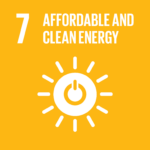The agreement will see TNB export 300 megawatts (MW) of renewable energy to Singapore, with the first phase—50 MW—beginning this month.
In a significant step toward regional energy collaboration and sustainability, Malaysia’s Tenaga Nasional Berhad (TNB) and Singapore’s Sembcorp Power have signed an agreement to export renewable energy to Singapore. This partnership marks a milestone in ASEAN’s push for a unified energy market and reinforces the two nations’ commitment to transitioning to cleaner energy sources.
RELEVANT SUSTAINABLE GOALS



First Phase of Renewable Energy Exports Begins
The agreement will see TNB export 300 megawatts (MW) of renewable energy to Singapore, with the first phase—50 MW—beginning this month. Malaysia’s Ministry of Energy Transition and Water Transformation announced that this initial supply would be delivered via existing infrastructure connecting the two countries, ensuring seamless integration into Singapore’s energy grid.
Facilitated by Energy Exchange Malaysia (Enegem), the deal is the result of a competitive bidding process in June. Enegem’s auctioning mechanism enables efficient cross-border renewable-energy transactions and encourages broader participation from renewable energy suppliers.
A Key Step in ASEAN’s Energy Integration
The initiative is part of the ASEAN Power Grid project, which aims to enhance regional energy security, efficiency, and sustainability by promoting interconnected energy systems among member states. TNB and Sembcorp Power emphasized the alignment of this programme with the ASEAN Power Grid vision and Malaysia’s energy-transition goals.
“This programme positions Malaysia as a key player in green electricity trading while promoting energy security, efficiency, and sustainability across the region,” said Megat Jalaluddin Megat Hassan, TNB’s president and CEO.
Malaysia stands to gain significantly from this renewable energy export programme. By expanding its renewable energy sector, the country could benefit from favorable pricing, foreign exchange gains, and enhanced energy trade capabilities. The initiative also underscores Malaysia’s growing role as a regional leader in renewable energy development and green electricity trading.
For Singapore, the partnership aligns with its target to import up to 4 gigawatts of low-carbon electricity by 2035, which will account for approximately 30% of the city-state’s total electricity supply. This move is part of Singapore’s broader strategy to diversify its energy mix and achieve greater sustainability in its power sector.
A Model for Regional Collaboration
The partnership between TNB and Sembcorp Power exemplifies how cross-border energy trade can benefit both exporting and importing countries while fostering regional energy integration. The use of existing infrastructure ensures cost-effective implementation, and the involvement of Enegem highlights the importance of efficient, transparent mechanisms in facilitating renewable energy trade.
By leveraging their geographic proximity and shared commitment to sustainability, Malaysia and Singapore are setting a precedent for how nations can work together to address regional energy needs while advancing global climate goals.
The inaugural 50 MW supply is just the beginning, and as the programme scales up to 300 MW, both nations are poised to make significant strides in creating a greener, more interconnected energy future.
Lead image of Singapore Center courtesy of George Dolgikh
You may also be interested in :
Southeast Asia’s Renewable Energy Potential: Can The Region Catch Up to Global Leaders ?



